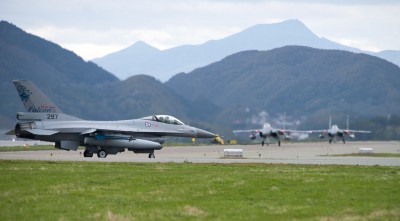Russia’s embassy in Oslo has responded in detail to questions raised about its intentions in the Arctic. Meanwhile, displays of military force continue on both sides of the border Norway shares with Russia, and the latter is meeting a planned, mostly European fighter jet exercise over Norway, Sweden and Finland with an exercise of its own involving double the number of military aircraft.

Norwegian Broadcasting (NRK) reported Tuesday morning that Russia is sending 250 of its own military aircraft this week to an exercise over the far northern areas of Ural and Siberia. According to news bureau DPA, Russia began its own massive military exercise on Monday. It will take place through Thursday and involve 12,000 soldiers, Russia’s defense department confirmed.
The goal of the exercise is “to increase preparedness for enemy air attacks,” according to Russian Defense Minister Sergei Sjoigu, and it comes just as Norway is leading the so-called “Arctic Challenge Exercise.” It started this week and involves 100 military aircraft from nine nations including Norway, Sweden, Finland, Switzerland, Great Britain, France, Germany, the US and the Netherlands. It will run through June 5 with 4,000 military personnel taking part from air force bases at Bodø in Northern Norway, Rovaniemi in Finland and Kallax in Sweden.
‘Natural’ for Russia to ‘re-establish’ in the Arctic
The two major military shows of force come at a time of heightened tensions between Russia and much of the rest of the western world. Russia’s annexation of Crimea last year and intervention in Ukraine has been followed by a marked display of renewed military might in the Arctic, while NATO and national defense forces in the Arctic launch new military exercises and discuss further build-up as well.
Russia’s embassy in Oslo now explains its recent displays of force as simply part of the country’s intentions to re-establish its position in the Arctic, an area widely viewed as strategically important.
“The Russian military activities in the north are not directed at other countries and are based on long-term national interests in this region,” Andrey Kulikov, press attache at the Embassy of Russian Federation in Oslo, told NRK. He claimed they were not a response to any “special” events or plans “from our neighbours,” but rather are a “natural part” of Russia’s efforts to “re-establish a presence in the Arctic, which the Russian armed forces all but abandoned completely after the collapse of the Soviet Union.”
‘Difficult to understand’ concerns
Kulikov wrote in an email to NRK that it was “very difficult for us to understand” why Norway and so many other countries in Europe and beyond are so worried about the current geo-political situation in Europe, including the situation in Crimea and eastern Ukraine. Russia continues to deny that it is supporting the separatists who have plunged Ukraine into civil war.
“Russia isn’t threatening any country, we respect international law, sovereign borders and human rights,” Kulikov wrote. He also noted that “we have lived in peace with Norway for more than a thousand years, and there are no intentions to change this. Russia won’t attack Norway and this is also the view that Norwegian military representatives officially confirm.”
He conceded that cooperation between Norway and Russia is under pressure. “We all know that Russian-Norwegian relations today face certain challenges that are quite unfortunate,” Kulikov wrote to NRK, “but this has not been at the initiative of Russian authorities.” He claimed that current sanctions against Russia won’t lead to any resolution of the challenges, nor will they reinforce “many hundred years” of being “good neighbours.”
‘Predictable’ response
Julie Wilhelmsen, a senior researcher at the Norwegian foreign policy institute NUPI who specializes in Russian relations, noted that Russia viewed last year’s regime change in Ukraine as an unacceptable coup, and therefore used military power to annex Crimea and intervene in eastern Ukraine. That in turn led to the sanctions and visa restrictions imposed by the west, along with the subsequent military buildups on both sides.
“Russia is a superpower that’s been lying with a broken back for 20 years,” Wilhelmsen told NRK. “The way Russia sees it, after building up and modernizing its military over a long period, it’s getting closer to a sort of normalcy in relation to its superpower status.” She added that Russians likely will also see it as natural for Norway to want to defend itself. “Russian politicians would think that anyone who doesn’t think like that, from a realistic perspective, is stupid,” she said.
Wilhelmsen called Kulikov’s response “predictable” and in line with what’s been said earlier. “The rhetoric will claim that Russia is not aggressive, and that says something about how media and the information war functions in Russia today,” she told NRK, adding that control over the description of reality has long been important in Russian politics. “An official version of a situation is created and that’s reproduced in all channels,” Wilhelmsen said.
Wilhelmsen, known as one of Norway’s experts on Russia, said she thinks western media outlets do have a tendency to demonize Russia, dismissing information from Russia as “propaganda.” Asked whether Russia’s diplomats themselves believe what they’re asked to say, she said, “no, not necessarily. I have heard that there is today little autonomy at the embassies and that they simply repeat the only acceptable version, that Russia is not in eastern Ukrain and that the annexation of Crimea came after a referendum over which Russia had no influence. This is certainly wearisome for some of the diplomats.”
newsinenglish.no/Nina Berglund

